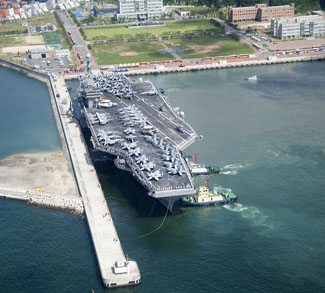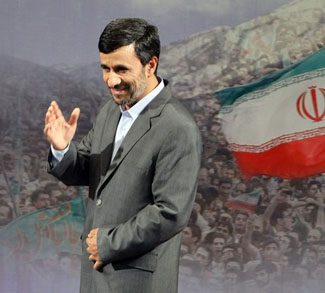Of the fifteen republics in the USSR, only Russia and Armenia harbored revanchist territorial claims towards their neighbors based on nationalistic myths of a historical state that was larger than their Soviet republic. Russian and Armenian imperial nationalists had powerful allies – the Russian Orthodox Church and Armenian Apostolic Church – who strongly backed their territorial irredentism.
Russian President Vladimir Putin has described the USSR as ‘Historic Russia,’ reflecting a common Russian nationalist image of ‘Russia’ as bigger than its official republic. Russian imperial nationalists never imagined their ‘Russia’ to be either the Soviet Russian or Russian Federation republics.
Armenian imperial nationalists similarly supported territorial irridentism towards establishing ‘historic Armenia’ that were larger than the Soviet Armenian republic. Armenian imperial nationalists won the First Karabakh War between 1988-1994 and occupied a fifth of Azerbaijan for nearly three decades. At the center of this territory was Karabakh, which with the support of Armenia and Russia built its own separatist military forces.
Pro-democratic forces were eclipsed by imperial nationalists in both the Russian and Armenian diasporas. The Russian and Armenian diasporas were consequently also more nationalistic than democratic and supported irredentist claims of a greater Russia and greater Armenia.
There were always few Russians who upheld democratic over imperial nationalistic views, especially towards Ukraine and Crimea. The leader of Russia’s democratic opposition, Alexei Navalny, supported Russia’s annexation of Crimea, agreed that Russians and Ukrainians are ‘one people,’ and condemned autocephaly for the Orthodox Church of Ukraine. Ukrainians are critical of what they see as a rather weak Russian opposition to the Kremlin’s war against Ukraine.
Armenia has a chance to be different. The 2018 revolution brought democratic forces to power in Armenia led by Nikol Pashinyan. He faces tremendous opposition to building a post-imperial Armenia content within its former Soviet borders from a vocal nationalistic constituency led by the Armenian Church and its diaspora supporters.
Pashinyan believes Armenians should support what he defines as ‘real Armenia,’ understood as the Armenia which existed within republican boundaries for seven decades within the USSR. Pashinyan has said that a country at peace with its neighbors and seeking integration into Europe is only possible if Armenians reject ‘historical [i.e., greater] Armenia.’ In June 2023, Pashinyan explained to the Armenian parliament that the ‘debate’ is whether ‘the real Armenia serves the historical Armenia, or should the historical Armenia serve the real Armenia?’
The Russian Orthodox Church (ROC) and Patriarch Kirill are vocal and powerful supporters of Russia’s war against Ukraine, buying into all the Kremlin’s ideological drivers. At a recent conference of the World Russian Peoples Council, attended by Kirill and Putin, a declaration on the Russian World outlined the ROC’s support for the ‘liberation’ of ‘historic Russian lands’ in southeast Ukraine and the legal codification of the triune (three part) pan-Russian people of great, little, and white Russians (Russians, Ukrainians, and Belarusians respectively). The ROC does not define what is taking place in Ukraine as a war but as an ‘internecine strife’ while Putin describes it as a ‘civil war’ between branches of the pan-Russian people.
The ROC has instructed its clergy to change their liturgy to include prayers in support of Russia’s war against Ukraine and is threatening to defrock clergy who do not support the war. Patriarch Kirill has been criminally sanctioned by the Security Service of Ukraine for supporting Russia’s war against Ukraine.
The Russian Orthodox Church was revived by Joseph Stalin in 1943 and was run and infiltrated by the KGB until the USSR disintegrated in 1991, an imperial nationalist alliance that was rebuilt by Putin since he first came to power nearly a quarter of a century ago. The Russian Orthodox Church’s imperial nationalism was reinforced in 2007 when it united with the diaspora ROC dominated by White Russian emigres who had always claimed Ukraine is Little Russia and Ukrainians are a Little Russian branch of the pan-Russian people. Putin’s routinely cites White Russian émigré Ivan Ilyin who held such views.
Inside parliament, the opposition Armenian Alliance, led by Robert Kocharyan, and I Have Honor, led by Serzh Sargsyan, have leaders discredited by decades of corruption and economic mismanagement of Armenia. Their pro-Russian foreign and security policies proved to be of little use in the Second Karabakh War in 2020, when Russia and the Russian-led (Collective Security Treaty Organization) did not intervene in support of Armenia.
The main party in Armenian Alliance is the extremist Armenian Revolutionary Federation ([ARF] commonly known as Dashnaks) who, despite being pro-Russian, is highly influential in the diaspora and the Armenian National Committee of America in the United States. Clergy leading the protests have been seen with Hampig Sassouninan, who was sentenced to life imprisonment for assassinating the Turkish Consul in Los Angeles in 1982, with his court fees paid by the ARF, but was controversially pardoned by the U.S. in 2021. The Armenian Secret Army for the Liberation of Armenia, active from 1975-1991, murdered 46 and injured 299 mainly Turkish officials.
These discredited political and religious forces are hiding behind the Armenian Apostolic Church, which has been leading calls for Pashinyan’s resignation. The Armenian Apostolic Church is a close ally of the Russian Orthodox Church and the Catholicos, head of the Church, received a medal of honor from Putin in 2022, the year of Russia’s full-scale invasion of Ukraine.
There are widespread suspicions anti-Pashinyan protests are backed by Russia. Foreign Minister Ararat Mirzoyan accused the campaign against a peace treaty with Azerbaijan as working at the ‘dictation of another country,’ a veiled reference to Russia. The Kremlin’s criticism of Pashinyan is becoming more vocal and threatening in response to his support for withdrawing Armenia from the CSTO, removing Russian border guards from Yerevan’s airport, and pursuing integration with Europe. Pashinyan has more than once warned Russia is supporting coup attempts against him.
The Armenian Apostolic Church is a vocal supporter of ‘historic [i.e., greater] Armenia’ and staunch opponent of a peace treaty with Azerbaijan that would recognize Soviet republican boundaries as international borders. Despite a constitutionally mandated separation of Church and state, Catholicos Karekin II has called for Pashinyan’s resignation twice in 2020 and 2023.
The Armenian Apostolic Church has campaigned against the delimitation and demarcation of the border with Azerbaijan. Archbishop Bagrat Galstanyan said, ‘For the church, the approach of the authorities to resolving the conflict, which boils down to recognizing Artsakh [Karabakh]as part of Azerbaijan, is unacceptable.’ Former Karabakh leaders Arkhady Ghukasyan and Bako Sahakyan, together with Kocharyan and Sargsyan, were called to meet with the Catholicos before protests were organized.
Attempts to unseat Pashinyan through no-confidence votes in parliament have failed because the opposition’s 36 deputies are too few compared to the governing Civil Contract Party’s faction of 71. Protest rallies, although initially large, have grown smaller in number. The Armenian silent majority may no longer have an appetite for further war and is quietly backing the signing of an historic peace treaty with Azerbaijan by November when Baku hosts the COP29 summit.
The Russian Orthodox Church has no way back from its alliance with the Kremlin’s popular imperialist war of territorial conquest and genocide of Ukrainians. Russian opposition to the war inside Russia is crushed while the new Russian diaspora, even in democratic states, is surprisingly passive and ineffectual. Anti-war clergy within the ROC have yet to find their voice. The Armenian Apostolic Church, in contrast, is facing the reality that the Armenian government and, it would seem, most Armenians have transformed into supporters of ‘real’ by rejecting ‘historic’ Armenia.
Taras Kuzio is a British professor of political science at the National University Kyiv-Mohyla Academy of Kyiv, Ukraine, and author of ‘Fascism and Genocide. Russia’s War Against Ukrainians’ which is published by Columbia University Press.
The views expressed in this article belong to the author(s) alone and do not necessarily reflect those of Geopoliticalmonitor.com.




